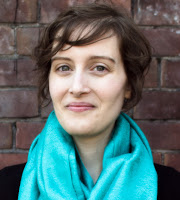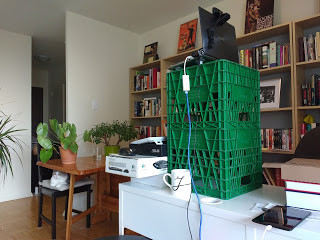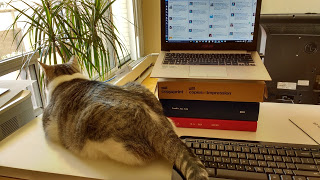I am Jennifer Polk, and This is How I Work
 Today, I have the pleasure of hosting Dr. Jennifer Polk. Jen helps PhDs launch meaningful careers, during and after graduate school. She speaks and writes on issues related to graduate education and career outcomes for doctoral-degree holders. Find her online at FromPhDtoLife.com, and at her award-winning University Affairs blog. Jen earned her PhD from the University of Toronto.
Today, I have the pleasure of hosting Dr. Jennifer Polk. Jen helps PhDs launch meaningful careers, during and after graduate school. She speaks and writes on issues related to graduate education and career outcomes for doctoral-degree holders. Find her online at FromPhDtoLife.com, and at her award-winning University Affairs blog. Jen earned her PhD from the University of Toronto.
Current Job: Coach and Entrepreneur
Current Location: Toronto, ON, Canada
Current mobile device: Nexus 7 (tablet), Moto G 3rd Gen (phone)
Current computer: Asus Zenbook (2013)
Can you briefly explain your current situation and research to us?
I work primarily as an academic, career, and life coach for graduate students and PhDs; this business is called From PhD to Life. That means I speak 1-on-1 with clients who are navigating a variety of different situations. They are feeling stuck in some way and want to move forward, and so we make sure that happens, in whatever way is right for their priorities, interests, values, and strengths. I have clients from around the world, but mostly across North America.
I just launched a new online community called Self-Employed PhD. It’s in beta mode through January 2017, and I’m really excited to see where this project goes in future.
My other existing business is a partnership with another PhD, Maren Wood. This is Beyond the Professoriate. It started as an annual online conference — think series of webinars over two days — and we’ve now branched out to offer an online Job Search Course for PhDs (beginning again in January 2017). The 4th annual conference is happening 6 & 13 May, and we’re also planning a year-long subscription series so we can offer more programming.
What tools, apps and software are essential to your workflow?
I use Gmail to manage all my email accounts, Google Calendar to schedule everything I need to do, and Workflowy to keep track off all the tasks I need to get to, now or later. I track my time using Toggl. It’s been eye-opening to learn how much productive work I do vs how long I’m “at the office.”
My clients book appointments with me via ScheduleOnce, which syncs with my Google Calendar. I love it. When I send invoices, I use Freshbooks. I’ve used PayPal, too. Both work well for bookkeeping and accounting.
I use social media in my personal and professional life, and especially value Twitter. When I’m at my laptop I access Twitter via Tweetdeck (and this is how I run my #withaPhD chats). I also use a scheduler for Twitter, namely MeetEdgar. If you see me posting at 3am, it’s probably coming from Edgar! My RSS reader of choice is Feedly. When I come across an article or blog post I want to save, I add it to an Evernote notebook. I also use Google Drive to save .pdfs, especially ones that I want to share with Maren. She and I collaborate on docs and spreadsheets together, too. Other collaboration tools I’ve used productively include Slack, a great way to communicate with team members (and students enrolled in an online course, or virtual conference attendees) without sending a bunch of emails back and forth.
For keeping in touch with potential clients, I use Mailchimp. To help me manage ongoing networking, I’ve recently started using Contactually. It’s expensive but I think worth it for me. A free tool that I’ve used more and more over the past few months is mail merge. These days I use Yet Another Mail Merge, which is a Google add-on. It’s incredibly useful.
Most of my Canadian clients phone me directly; my other clients connect with me via Skype or Zoom. I’m using the latter to host group events and interviews for Self-Employed PhD, and it works great.
All my websites use WordPress (both .com and .org), and University Affairs — a bigger site that I blog for — is also run on WP.
Phew! I suspect I’m forgetting some things. The ones I listed are all tools I use on a weekly or daily basis. My business mostly lives in the cloud! But when I’m taking notes while speaking with clients, I do it the old fashioned way: with pen and paper. I file those notes in a physical filing cabinet.
What does your workspace setup look like?
I work from home, and my “office” is one corner of my living/dining room. I have a desk, two filing cabinets, bookshelves, and an office chair, as well as a laser printer (it gets occasional use), a separate webcam, bluetooth devices, external keyboard and mouse, and other gadgets. I can sit at my desk or set up a makeshift standing desk using some boxes and milkcrates I rescued from the garbage a couple years ago. Right now I’m sitting at my desk and my laptop is propped up on boxes as well as my MA thesis and PhD dissertation. My cat Izzy is sleeping on the desk to my left. If I don’t leave room for her, she’ll sit on the printer, which I don’t want!
What is your best advice for productive academic work?
I wouldn’t get anything done without Google Calendar. Scheduling both meetings & tasks is absolutely crucial for me. I never accomplish as much as I plan, which is something I’d say to others: everything takes longer than you think it will, or should. Leave lots of white space and remember that 25 to 30 hours of actual, purposeful work a week is plenty.
How do you keep an overview of projects and tasks?
I don’t have a perfect system for this, but Workflowy is what I currently use as a task manager. I’m loathe to upgrade to something more complex but I’ll probably need to in future.
Besides phone and computer, do you use other technological tools in work and daily life?
I have a tablet that I can check email on, read Feedly, etc. I recently removed Facebook and Twitter from this device, which has helped me relax! I use my tablet primarily as an e-reader.
Which skill makes you stand out as an academic?
I don’t work as an academic according to standard definitions, but I do work with a lot of them as clients! I’d like to think that my positivity, honesty, inclusiveness, and commitment to sharing great information, resources, and inspiring stories is what draws potential clients and collaborators to me. I really love the #withaPhD chats — I think they showcase what I’m all about: bringing us all together, from graduate students to tenured professors and PhDs working in all sorts of different jobs, to talk about what’s important to us as people and professionals. We share resources, support each other, reflect back and plan for the future together. That’s the idea, anyway!
What do you listen to when you work?
Nothing. I need complete silence (and put up with noise from garbage trucks, construction, and leaf-blowers from the city outside).
What are you currently reading? How do you find time for reading?
Always! I read everyday, even if just for a few minutes before bed. Novels. All sorts. I recently started reading Octavia Butler’s Dawn on my tablet. The Toronto Public Library is my best friend.
Are you more of an introvert or extrovert? How does this influence your working habits?
Introvert! I love working from home. I speak w clients and collaborators almost every day but I need time not to talk to anyone.
What’s your sleep routine like?
On an average day I’ll wake up around 8am and aim to be in bed for midnight.
What’s your work routine like?
I get to work pretty soon after getting up, most days. I generally work 9-5 hours but I can take breaks or run errands during the day as necessary. I try not to work in the evenings, but I do sometimes have clients or other work to do later on, and that’s fine. I almost never work on weekends.
I sometimes think I should start a bit earlier and take a regular mid-day break. We’ll see.
What’s the best advice you ever received?
When people ask me this question, the line that always comes to mind is, “Never explain, never apologize.” This comes from a very wise history professor I had during my MA, and it was something I really needed to hear. It’s advice I find myself coming back to again and again over the years since.
There are of course many excellent reasons why you would want to explain or apologize, for sure, but I do think in general it’s something to keep in mind, depending on what sort of person you are!


